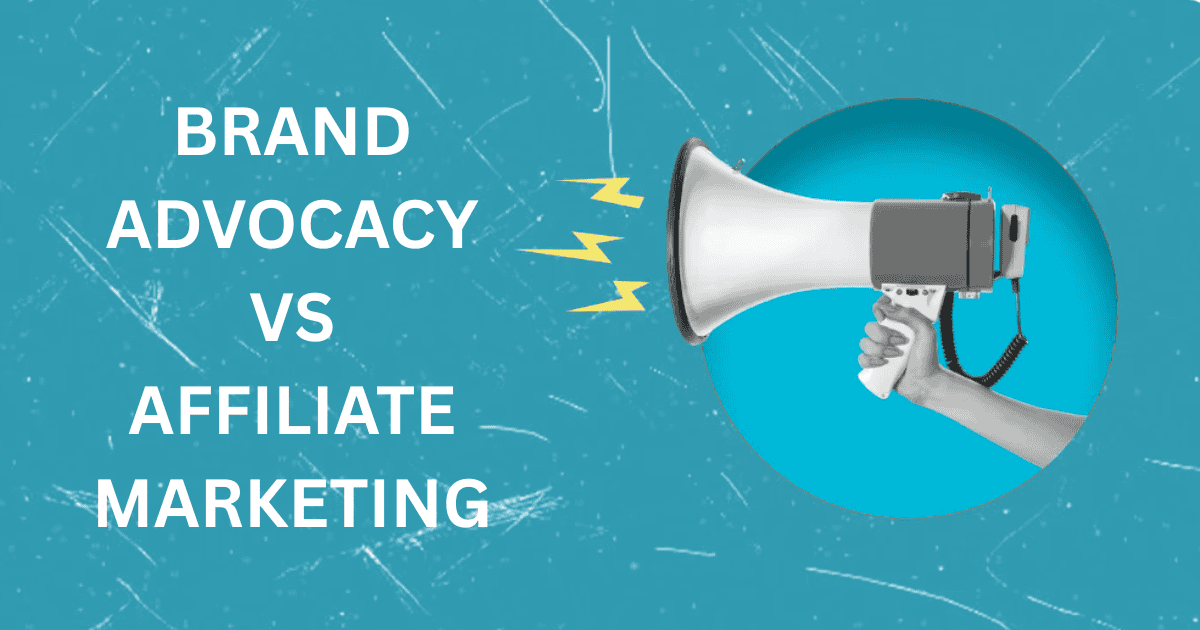Many businesses struggle to choose between brand advocacy and affiliate marketing for their growth strategies. Both approaches can drive sales and build brand awareness, but they work in fundamentally different ways. Understanding these differences helps you make the right choice for your business goals.
Brand advocacy focuses on building genuine relationships with customers who love your brand. These advocates share their positive experiences because they truly believe in your products. Affiliate marketing, on the other hand, creates partnerships with people who promote your brand primarily for financial rewards.
This guide breaks down the key differences between brand advocacy and affiliate marketing. You’ll learn how each strategy works, its unique benefits, and which approach might be better for your business. We’ll also explore how brand ambassador programs fit into the mix and why customer loyalty strategies matter more than ever.
What is Brand Advocacy?
Brand advocacy happens when satisfied customers become genuine supporters of your business. These advocates share positive experiences with friends, family, and their social networks without expecting payment. They create authentic word-of-mouth marketing that builds trust and credibility for your brand.
Customer advocacy stems from real satisfaction with your products or services. When someone has a great experience, they naturally want to tell others about it. This organic sharing creates powerful marketing because people trust recommendations from friends more than traditional advertising.

Brand ambassadors represent a more structured form of advocacy. These are loyal customers who participate in formal programs to promote your brand. They might receive free products, exclusive access, or small rewards, but their primary motivation remains genuine enthusiasm for your brand.
Employee advocacy also plays a crucial role in building brand trust. When your team members share positive content about their workplace, it creates authentic connections with potential customers and job candidates.
The benefits of brand advocacy include:
- Higher trust levels from potential customers
- Lower marketing costs compared to paid advertising
- Stronger customer loyalty and retention
- Authentic content creation from real users
- Improved brand reputation through genuine testimonials
What is Affiliate Marketing?
Affiliate marketing creates performance-based partnerships where affiliates earn commissions for driving sales or leads. Affiliates promote your products through their websites, social media, or other channels using special tracking links. When someone makes a purchase through their link, they receive a percentage of the sale.
How affiliate marketing works is straightforward. You provide affiliates with unique tracking codes or links. They share these links with their audience through blog posts, reviews, social media content, or email campaigns. Your tracking system records any sales that come from their efforts, and you pay them accordingly.
Referral programs often overlap with affiliate marketing but typically focus on existing customers. These programs encourage current customers to refer friends in exchange for discounts, credits, or cash rewards. The motivation is clearly transactional rather than purely advocacy-based.
Professional affiliates treat promotion as a business. They might promote multiple brands in the same category and choose products based on commission rates rather than personal preference. This doesn’t make their promotion less valuable, but it does create a different dynamic than pure advocacy.

Affiliate marketing benefits include:
- Scalable promotion through multiple partners
- Performance-based costs with measurable ROI
- Access to new audiences through affiliate networks
- Professional content creation from experienced marketers
- Clear tracking and attribution for sales
Key Differences Between Brand Advocacy and Affiliate Marketing
| Aspect | Brand Advocacy | Affiliate Marketing |
|---|---|---|
| Motivation | Driven by genuine love for the brand, emotional connection, and real user satisfaction. | Driven primarily by financial commissions, performance bonuses, and revenue opportunities. |
| Behavior | Naturally shares experiences through personal stories, social posts, or recommendations. | Creates strategic, targeted content designed to increase clicks and conversions. |
| Compensation | Often unpaid or rewarded with perks like free products, early access, VIP benefits, or recognition. | Earns commissions per sale, lead, or click, with clear payout structures and performance metrics. |
| Content Style | Authentic, conversational, user-generated content that feels relatable and trustworthy. | More polished, optimized, and persuasive content such as reviews, tutorials, comparisons, and guides. |
| Relationship Duration | Long-term brand loyalty that can last years due to genuine satisfaction. | Varies based on commission rates, product demand, and profitability for the affiliate. |
| Audience Response | Audience responds positively to personal stories and authentic endorsements. | Audience expects detailed, tested reviews with evidence, pros/cons, and expert-level insights. |
| Reach | Smaller but highly trusted networks (friends, followers, colleagues). | Larger potential reach through blogs, websites, email lists, and social media channels. |
| Brand Control | Less brand control—advocates share freely based on experience. | More structured control with guidelines, affiliate policies, and approved promotional materials. |
| Trust Level | Extremely high trust because advocates have no financial bias. | Good trust, but audiences may factor in the financial incentive behind the promotion. |
| Scalability | Harder to scale quickly; relies on organic enthusiasm and customer experience. | Highly scalable due to affiliate networks, automated systems, and performance tracking tools. |
| Cost Structure | Lower direct cost—main investments are in product quality and customer experience. | Predictable, performance-based costs tied directly to conversions and revenue. |
| Type of Promoters | Real customers, brand fans, employees, and loyal users. | Bloggers, content creators, influencers, niche reviewers, and industry professionals. |
| Primary Goal | Build trust, brand loyalty, and long-term community engagement. | Drive measurable sales, leads, and marketing ROI. |
| Content Ownership | User-generated content often owned by the advocate. | Brands can often repurpose affiliate content for campaigns with approval. |
| Examples of Activities | Posting personal reviews, sharing positive experiences, using branded hashtags, referring friends. | Writing product reviews, publishing comparison blogs, creating promo videos, running email campaigns. |
Building Brand Trust Through Authentic Partnerships
Brand trust grows in different ways when comparing brand advocacy and affiliate marketing. Advocacy builds trust through authentic marketing—genuine customer experiences, organic recommendations, and real stories shared by people who truly use your products. In contrast, affiliate marketing strengthens trust by providing detailed product insights, expert reviews, and credibility-backed comparisons that help consumers make informed decisions.
In today’s digital landscape, word-of-mouth marketing remains one of the strongest trust-building forces. Whether the recommendation comes from loyal brand advocates or experienced affiliates, people naturally trust human voices more than traditional ads. This makes trust-based marketing incredibly valuable—especially when content feels honest, transparent, and genuinely helpful.
A key part of earning trust through any brand partnership is transparency. Both advocates and affiliates should clearly disclose their relationship with your brand. This level of openness—whether noted in captions, blogs, or product reviews—actually boosts consumer trust and enhances your brand’s credibility.
Ultimately, building brand trust isn’t a quick tactic; it’s a long-term strategy. Consistency in product quality, customer experience, and the way you manage partner relationships forms the core of sustainable trust-building. Whether you lean on organic advocacy or performance-driven affiliate promotion, authentic communication and reliability will always be the foundation of lasting brand loyalty.
Which Strategy Works Best for Your Business?

Deciding between brand advocacy and affiliate marketing comes down to your overarching business objectives, your target audience behavior, and the resources you can allocate. Many brands adopt a blended approach, using both strategies to strengthen customer relationships while simultaneously driving scalable growth.
Brand advocacy is the stronger choice when your product or service naturally inspires emotional connection and customer loyalty. If people genuinely enjoy sharing their experiences, a structured advocacy or brand ambassador program can amplify this authentic word-of-mouth. This approach thrives on exceptional customer service, consistent product quality, and a loyalty-driven marketing mindset.
On the other hand, affiliate marketing is ideal when you need rapid audience expansion or want to tap into new customer segments. Affiliates—especially professional reviewers, influencers, and niche content creators—excel at producing comparison content, product reviews, and conversion-focused campaigns. This performance-based model requires reliable tracking systems, competitive commission rates, and ongoing optimization.
Your customer lifecycle also plays a key role. Startups and newer brands often see faster benefits from affiliate marketing because it boosts early-stage awareness and lead generation. Established brands with strong customer satisfaction metrics may gain more from advocacy programs that deepen trust and strengthen long-term relationships.
Budget allocation matters as well.
-
Brand advocacy usually requires less direct financial investment but demands ongoing engagement and community management.
-
Affiliate marketing involves paying commissions but offers predictable, performance-based scalability.
Ultimately, the best approach depends on where your brand is today—and where you want it to grow tomorrow.
Making the Right Choice for Your Brand
Choosing between brand advocacy and affiliate marketing ultimately depends on your business goals, target audience, and long-term growth strategy. Both approaches can drive significant results, and many brands use a hybrid marketing model to get the best of both worlds.
Begin by analyzing your customer satisfaction metrics and loyalty signals. If you already have enthusiastic customers who naturally share positive experiences, launching a brand advocacy program or brand ambassador initiative is a logical next step. These organic recommendations help strengthen trust, credibility, and long-term customer loyalty.
If your goal is rapid expansion or reaching new market segments, affiliate marketing can deliver faster results. Affiliates bring in fresh audiences through targeted content, performance-based promotion, and conversion-driven campaigns.
A smart way to choose is by testing both strategies on a small scale. For example, you can launch a small ambassador program for loyal customers while partnering with a select group of affiliates. Track performance, referral quality, engagement levels, and ROI. Then refine your approach based on real data.
Keep in mind that success with either model requires ongoing management, optimization, and clear communication. Advocacy programs thrive on consistent engagement and genuine relationships. Affiliate partnerships need strong tracking, fair commissions, and responsive communication.
Above all, authenticity matters most. Whether you’re working with loyal advocates or performance-focused affiliates, ensure that every partnership reflects your brand values, your product quality, and the genuine value you offer. The brands that win long term are those that build trust—not just transactions.
FAQs
1. What is the main difference between brand advocacy and affiliate marketing?
Brand advocacy is driven by genuine customer love and organic word-of-mouth, while affiliate marketing is primarily incentivized by commissions and performance-based payouts.
2. Is brand advocacy more effective than affiliate marketing?
It depends on your goals. Brand advocacy is more effective for building trust, authenticity, and long-term loyalty, whereas affiliate marketing is better for rapid reach, measurable ROI, and scalable acquisition.
3. Can a business use both brand advocacy and affiliate marketing together?
Yes. Many successful brands run ambassador programs and affiliate campaigns simultaneously. Combining both creates a stronger marketing ecosystem that taps into authenticity and performance-driven growth.
4. What types of businesses benefit most from brand advocacy programs?
Brands with loyal customers, strong customer satisfaction, and emotional or lifestyle-driven products benefit the most. Industries like beauty, fitness, tech, and consumer goods see strong advocacy results.
5. How do affiliate links and tracking work for marketers?
Affiliates receive unique tracking links or codes that monitor clicks, leads, and sales. When someone purchases through the link, the affiliate earns a commission based on preset performance metrics.
6. What motivates customers to become brand advocates or ambassadors?
Advocates are motivated by authentic satisfaction, love for the product, community recognition, exclusive perks, early access, and personal connection to the brand—rather than direct financial incentives.





